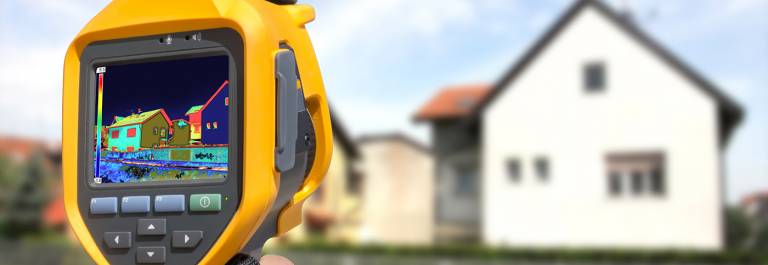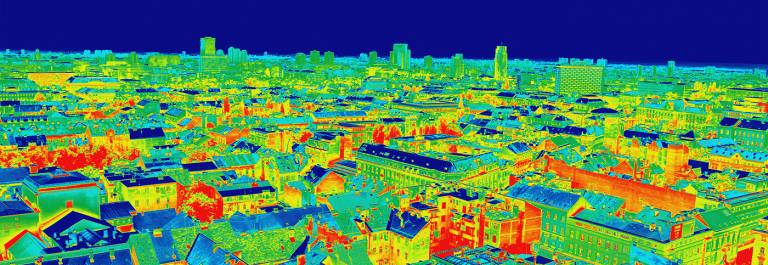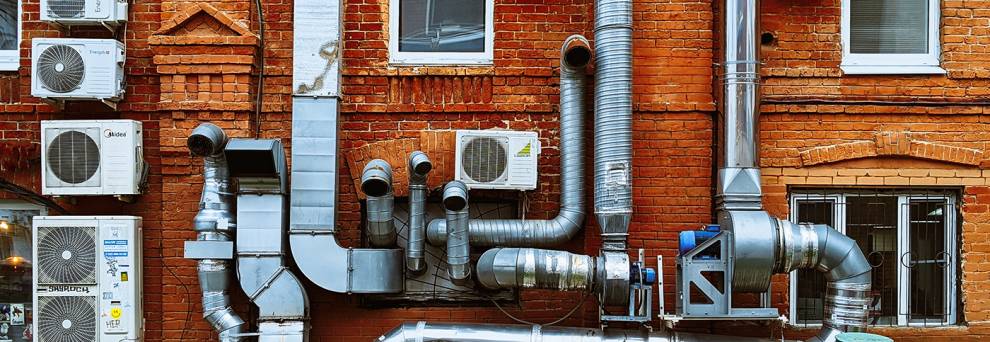Physical Characterisation of Buildings
The Physical Characterisation of Buildings Group investigates the empirical energy performance of buildings. We research (hygro)thermal performance and ventilation, applying physics and statistical techniques to both develop methods for the evaluation of the real, observed, thermodynamic behaviour of buildings and to derive a greater appreciation of the performance of the built stock.
The group’s research addresses energy efficiency improvements, heating decarbonisation, understanding the conditions experienced by occupants and enabling more flexible operation. This supports energy policymaking, improving living conditions, decreasing operating costs and improved energy security.
Our research interests
The Physical Characterisation of Buildings Group research addresses the in-situ thermal performance of buildings, their components and systems. We measure the characteristics of performance (e.g. energy use, internal temperature, CO2 concentration) to create large datasets and use a wide range analytical tools to derive insights into building performance and the impacts of occupant practices. We also undertake socio-technical research by collaborating with social scientists to deliver both detailed insights and practical solutions.
Characterising the whole house thermal performance of occupied buildings

Decarbonising heating and cooling

Elemental thermal performance

Ventilation and indoor environmental quality

Enabling the flexible operation of heating

Research with impact
The Buildings Theme and Physical Characterisation of Buildings group focus on delivering impact through research to support decarbonisation and improved quality of life. Our research is highly applied and involves working with partners in government (e.g. the Department of Business Energy and Industrial Strategy), industry (e.g. PassivUK) and non-governmental organisations (e.g. Ofgem, the UK Health Security Agency). Through research and consultancy, we aim to provide a solid evidence base for decision making and tools to enable future insights.
Our projects
The Physical Charactisation of Buildings group has contributed to a range of different projects to undertake high quality original research into the energy performance of buildings. We work with colleagues across the UCL Energy Institute researching Energy & Buildings, and collaborate with researchers in other institutions to develop scientific, policy and socio-technical insights.
Energy performance of buildings in teaching

The Physical Characterisation of Buildings group are closely engaged with teaching the Smart Energy and the Built Environment MSc, also acting as dissertation tutors for the MSc Energy Systems and Data Analytics. We aim to relate our research to taught material, providing cutting-edge lectures and tutorials that are both engaging and relevant to students.
We also support and work closely with the EPRSC Centre for Doctoral Training in Energy Resilience and the Built Environment, teaching and supervising students in addition to contributing to the wider training programme.
Smart Energy and the Built Environment MSc
The physical performance of buildings and the systems within them, such as heating plant and ventilation, is central to understanding how the built environment can transition to smarter operation, set within the context of practice and policy: we aim to bring these aspects to the Smart Energy and the Built Environmeny MSc degree.
All modules within Smart Energy and the Built Environmeny MSc are relevant to the Physical Characterisation of Buildings group’s work, but in particular Fundamentals of Smart Energy and the Built Environment and Smart Distributed Energy Systems relate closely to our interests and research.
We support a wide range of dissertations, primarily focussed on the physical performance of buildings. These include the analysis of datasets to better understand building performance, derive the metered energy saving of a retrofit and to determine how a heat pump is working. Students may measure energy use or other factors such as ventilation rates, or explore secondary data and we aim to tailor the research to students’ interests and skills. Previous dissertations include “Physical constraints on the energy flexibility of homes with heat pumps” and “Developing a linear regression model for prediction of UK residential energy consumption”.
View Smart Energy and the Built Environment MSc in the UCL Prospectus ►
Doctoral Research (PhD)
Our group is closely engaged with the EPSRC Centres for Doctoral Training in Energy Demand (LoLo) and Energy Resilience and the Built Environment (ERBE); Cliff Elwell is the Deputy Director and Jenny Crawley the Academic Manager of these CDTs. Our team is engaged in all aspects of these programmes, including teaching courses, providing training and supervising students. We additionally seek to supervise non-CDT students who share our research interests. Current students:
Doctoral research relating to Physical Characterisation of Buildings
- Minnie Ashdown - Understanding the variability of air infiltration in buildings through statistical analysis of CO2time series data and a probabilistic conservation law
- Laurence Childs - Data driven approach to identifying building retrofit pathways
- Cairan Van Rooyen - The relationship between ventilation practices, indoor air quality, noise and overheating, and their impact on health
- Adria Martin Vilaseca - Transforming home heating: How smart platforms can help users navigate new everyday experiences and trade-offs
- William Markiewicz - Data Driven Approach to Modelling the Resource Footprints of Live Data Streams in Digital Twins
Our researchers

Research Associate
View Jenny's profile
Send Jenny an email

Professor of Building Physics
View Cliff's profile
Send Cliff an email

Lecturer in Energy and Buildings
View Virginia's profile
Send Virginia an email

LoLo & ERBE Academic Manager and Research Fellow in Buildings and Energy
View Clare's profile
Send Clare an email

Research Fellow in Physical Characterisation of Buildings
View Frances's profile
Send Frances an email

Senior Technician – Physical building Performance
Send Jez an email



 Close
Close


